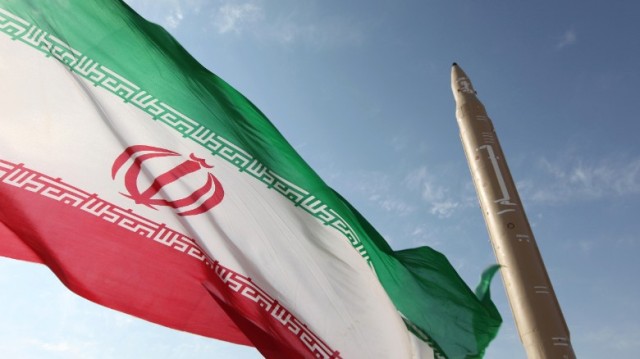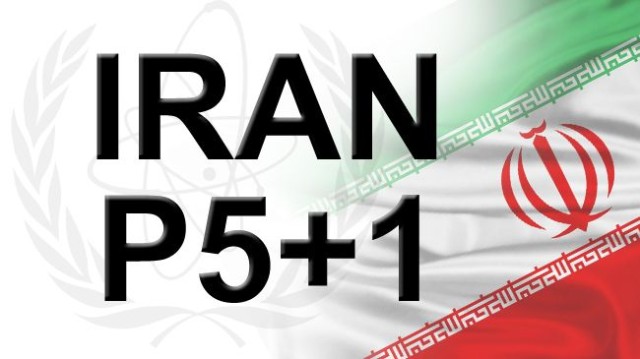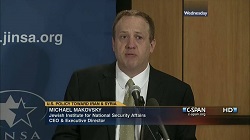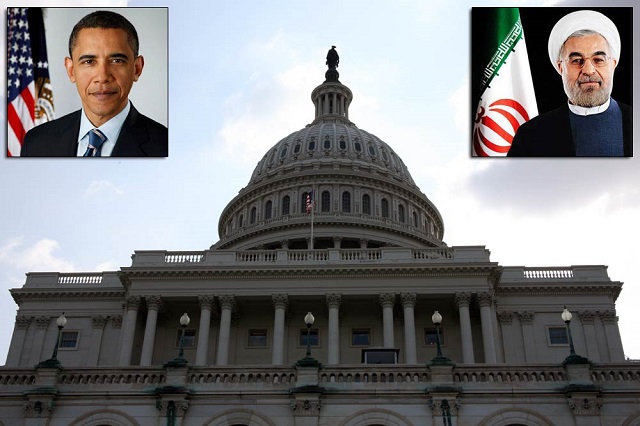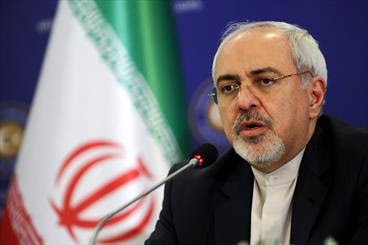Yesterday, President Putin was up to his usual antics lifting the 2010 moratorium on sale of the Russian S-300 advanced air defense system. This was exquisitely timed to consternate the efforts of President Obama and Secretary of State Kerry in the midst of trying to sell Congress today on the merits of the inchoate P5+1 nuclear deal with Iran. In diplo-speak the most the White House and State Department could say in response was that Putin’s action was “unhelpful”. State Department spokesperson Marie Harf in response to questions raised in yesterday‘s Daily Press Briefing said:
“We think given Iran’s destabilizing actions in the region, in places like Yemen or Syria or Lebanon that this isn’t the time to be selling these kind of systems to them.” But she added: “We don’t think this will have an impact on unity in terms of inside the negotiating room.”
For Israeli Prime Minister Netanyahu it was evidence that Russia, as we wrote in January may have signed on to the Axis of Resistance . At the time on January 20th, smiling Russian and Iranian Defense Ministers met in Tehran, shook hands and publicly announced that the moratorium was passé. The $800 million paid by Iran for the S-300 air defense system would finally be honored and the new toys delivered to protect Iran‘s nuclear and military development centers from an air assault by Israel. We wrote:
Russian Defense Minister Sergei Shoigu signed an “cooperation” agreement with Iranian Defense Minister Hossein Dehghan in Tehran. Both countries are the targets of Western and US Sanctions. Both countries are afflicted with erosion of oil and energy revenues. Both countries are seeking to blunt opposing US interests in Eastern Europe and the Middle East. That is reflected in a comment of Iranian State television by Dehghan reported by AFP, that Iran and Russia had a “shared analysis of US global strategy, its interference in regional and international affairs and the need to cooperate in the struggle against the interference of foreign forces in the region.” There is also the matter of weapon systems deals with proceeds which might bolster Russia’s depleting foreign currency reserves, while combating America’s ally in the Middle East, Israel.
Iranian Defense Minister Dehghan in light of Putin lifting the moratorium on the S-300 sale said: “Extra-regional threats and the spread of terrorism by (insurgent) groups have increased the need to further expand cooperation.” Note this Wall Street Journal comment about who directly benefits in Russia from the sale of the Antey S-300 System to Iran:
Rostec Corporation Chief Executive Officer Sergei Chemezov said in February that Iran was still considering Russia’s offer to supply Antey-2500 missile systems, with a range of about 200 kilometers (125 miles), according to Russian state news agency TASS. Rostec didn’t immediately respond to questions about the status of the offer on Monday.
Mr. Chemezov, who became friends with Mr. Putin when the two worked for the KGB in the 1980s, is among those sanctioned by the U.S. over the crisis in Ukraine.
That was a prelude to yesterday’s announcement from the Kremlin. Putin purposefully chose yesterday to rattle the West Wing, Foggy Bottom and Jerusalem by proving that sanctions, whether UN, EU or Congressional are next to useless when it comes to dealing with rogue regimes. The only thing these masters of disinformation and mischief understand is the willingness to back up words with commitment to us military power. Something lacking in the backbone of the P5+1 cabal lusting after exchanges with the Mahdist Mullahs in Tehran with visions of billion dollar and Euro development deals dancing in their minds. Senator Mark Kirk (R-IL), unlike the Metternichean Munchkins in the West Wing said it best in today’s Wall Street Journal:
“Before a final nuclear deal is even reached, [Russian President] Vladimir Putin has started to demolish international sanctions and ignore the U.N. arms embargo,” said Sen. Mark Kirk (R., Ill.), who sponsored legislation that seeks to impose new sanctions on Iran if a final deal isn’t reached by June 30.
Notice the assist that Foreign Minister Lavrov provided as rational for his boss’ latest chess move:
“At this stage, we believe the need for this kind of embargo, and a separate voluntary Russian embargo, has completely disappeared,” Mr. Lavrov said Monday, citing the recent progress in nuclear talks. He called the missile system “exclusively of a defensive nature” and said it “doesn’t threaten the security of any governments in the region, including, of course, Israel.”
Not trusting these fine words from Russian Foreign Minister Lavrov, Israeli Strategic Affairs Minister Yuval Steinitz said:
“It’s proof that the economic momentum that will come for Iran after lifting sanctions will be exploited for an arms buildup and not for the welfare of the people of Iran,” Israeli Intelligence Minister Yuval Steinitz said.
That must have garnered more respect from Secretary Kerry poised to brief House and Senate members this week on the nuclear deal with no content announced in Lausanne 12 days ago. Kerry had the cupidity to praise Russia for its constructive stand, a reference to a Foreign Ministry announcement allegedly saying that the State Department Fact Sheet on the parameters for a final agreement to be reached by June 30th was “accurate”. Note what Josh Earnest , White House Press Spokesperson said; “That underscores the kind of unity around the specific agreement that we believe has been critical to our success.” President Obama hedged his bets this weekend reiterating “the possibility of backsliding” before the June 30 deadline.
Something that both Supreme Ruler Ayatollah Khamenei and Foreign Minister Zarif suggested was simply “spin.” Then, last Thursday, Khamenei demanded that all sanctions be lifted upon signing of an agreement with the P5+1 and hands off our national security and military developments. Not to worry, said President Obama, Khamenei was simply grandstanding before his hard liners on their version of National Nuclear Development Day celebrations following their perceived victory on April 2nd in Switzerland. The deal with no content was still on despite the tough slog to create definitive terms by the deadline of June 30th. That the Congress shouldn’t interfere with what he deemed the “best bet” to prevent Iran from obtaining a nuclear device to complement its rising hegemony in the troubled Levant. He was like the Looney Tunes cartoons character Yosemite Sam suggesting to both Congress and Israel to “back off”. You will get your chance to learn about the final deal if and when it occurs. Not exactly confidence building steps.
President Obama stoked the disquiet over the P5+1 deal with remarks in both his New York Times and NPR interviews suggesting that Iran would be prevented from achieving nuclear breakout in the remaining months of his second and final term in office and that 10 to 15 years out, all bets were off about Iran’s ability to create nuclear weapons. President Obama always point to IAEA’s track record to conduct “robust intrusive” inspections. Weapons and the means of delivering them that some believe may have been covertly developed in cooperation with the DPRK. North Korea was beyond the ability of the IAEA to verify military nuclear development s as evidenced by the failure of a more worthy framework developed by the Clinton Administration that North Korea breached and was sanctioned by the Un repeatedly while relentlessly developing and testing nuclear weapons and the ICBMs to deliver them. Thereby putting the lie to President Obama’s assertion that “if Iran cheats, the world will know”. Rogue regimes, whether in Moscow, Pyongyang, or Tehran are your basic sociopaths. They believe that agreements are simply black dots on white paper, meaningless. Or as Humpty Dumpty said to Alice in Lewis Carroll’s Through the Looking Glass:
When I use a word,” Humpty Dumpty said, in rather a scornful tone, “it means just what I choose it to mean—neither more nor less.”
“The question is,” said Alice, “whether you can make words mean so many different things.”
“The question is,” said Humpty Dumpty, “which is to be master—that’s all.”
The Administration is rolling its big guns in briefings to both the House and Senate. Besides Kerry, Energy and Treasury Secretaries, Ernest Moniz and Jack Lew will be sent to the Hill to make the case for the P5+1 deal to proceed. Notwithstanding that Congress is poised for legislative action this week in a possible denouement with the White House. Embattled Democrat New Jersey U.S. Senator Bob Menendez , targeted with corruption charges by the Obama Justice Department, suggested he wasn’t “backing off” from his co-sponsorship with Republican colleague, Tennessee Senator Bob Corker , chair of the Senate Foreign Relations committee, of Iran nuclear deal review legislation. A vote is scheduled this week that may determine whether the bill is veto-proof, given a threat from President Obama. It appears from a Politico report today that Corker and the Democrats may have reached a compromise enabling passage by the Senate Foreign Relations Committee on Wednesday of the pending legislation. Given the emerging Iranian and now Russian defiance of sanctions and previous military developments inspections, the vote may be within striking distance of becoming veto proof on the Senate version of the pending legislation. Evidenced by comments from both House Speaker John Boehner and Majority Leader Rep. Kevin McCarthy (R-CA) that the GOP majority could deliver a veto proof vote on the Senate version.
Now, if you have gotten this far in reading this, you might ask whether the sophisticated S-300 system that the Wall Street Journal said was capable of knocking down swarms of cruise and ballistic missiles, attacking aircraft. Aircraft like the aging B-2 Stealth bomber capable of carrying that new and more powerful Massive Ordnance Penetrator that Secretary of Defense Ashton Carter said the USAF tested in January 2015. Think of what Israel did in 2008, a year following its destruction of a North Korean supplied nuclear reactor and bomb factory on the Euphrates River at al-Kibar in Syria in Operation Orchard. As we wrote in our January 2015 Axis of Resistance Iconoclast post:
In June 2008, Israel’s air force undertook massive air training exercises involving more than 100 aircraft in the eastern Mediterranean against Greek S-300 Russian air defense systems. That effort demonstrated the canny effectiveness of swarming attacks against the S-300 and later versions that upset the Iranian military and Revolutionary Guards.
That was seven years ago. Perhaps, Israel has followed with keen interest the development of advanced versions of the S-300, the S-400 and might have something in mind to keep Iran’s Defense establishment worried. Unlike their peers in the Pentagon, Israel doesn’t talk about such matters.
Meanwhile, will Congress act on Iran nuclear deal review legislation setting up a denouement with President Obama over his threat to veto it? Stay tuned for developments.
EDITORS NOTE: This column originally appeared in the New English Review.

